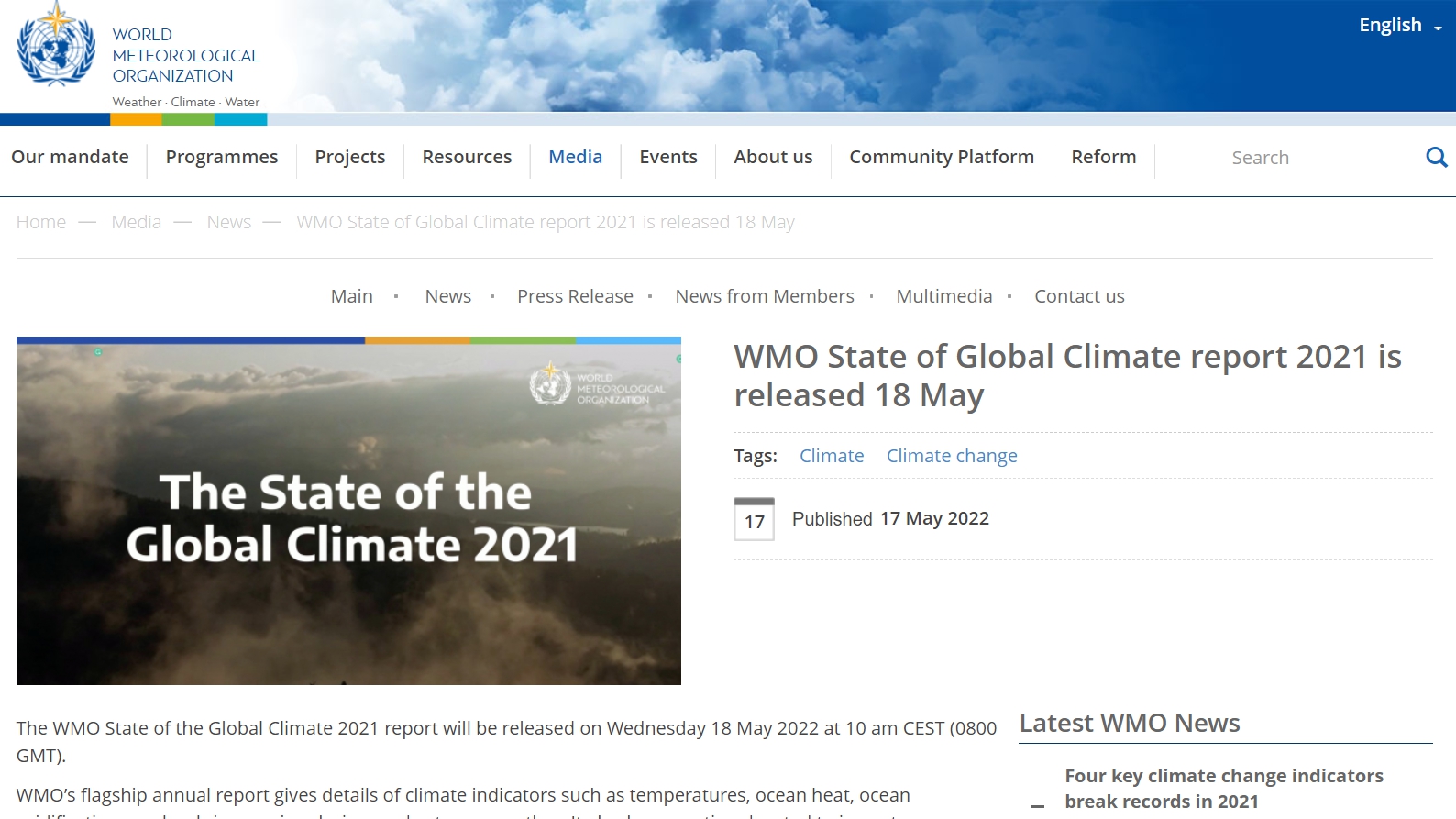
Screenshot from the official website of World Meteorological Organization.
Screenshot from the official website of World Meteorological Organization.
Editor's note: Stephen Ndegwa is a Nairobi-based communication expert, a lecturer-scholar at the United States International University-Africa, and an author and international affairs columnist. The article reflects the author's opinions and not necessarily the views of CGTN.
The State of the Global Climate 2021 Report released by the United Nation's World Meteorological Organization (WMO) on May 18 reads like a doomsday scenario. It paints a gloomy picture of what is happening to the world's environmental parameters including temperatures, ocean heat, ocean acidification, sea level rise, sea ice glaciers and extreme weather.
Basically, the world economy is not looking good. On account of recent global events, the International Monetary Fund projects that global growth will slow from an estimated 6.1 percent in 2021 to 3.6 percent in 2022 and 2023, which is a downgrade of 0.8 and 0.2 percentage points, respectively, from January projections.
While the decline is currently being attributed largely to the ongoing Russia-Ukraine war, the key factors are the same as the negative effects of climate change. There is almost no respite to the negative impact of climate change on sustainable development, food security, displacement and ecosystems. It is not the kind of news one would like to hear at a time when the global economy is still reeling from the devastation of the COVID-19 pandemic.
Climate change is exacerbating food insecurity as the phenomenon adversely affects rural livelihoods and incomes due to floods and prolonged dry spells. Food shortage is definitely a big blow to economic activities as it denies people the energy to actively and productively engage in income generating activities. The ripple effect of an unhealthy population also has a cost to the health sector due to an increase of incidents of disease.
Similarly, the destruction of coastal and marine ecosystems makes them unproductive and hampers economic activities in these areas. Pollution decimates marine life like fish while receding coastlines drives tourists away, negatively affecting governments' revenue collection. The loss of livelihoods also increases the number of people living both in and below poverty.
As countries restart their economies with the receding pandemic, climate change is leading to the displacement of large swathes of populations as they seek more habitable and productive environments. These disruptions lead to loss of man hours with the attendant loss of revenue at both household and national levels. A lot of money that could be invested in economic activities is now used to meet the costs of resettlement.
Climate change is a double jeopardy on sustainable development. It removes from Earth the tools of nature necessary for the planet's rejuvenation, making it more expensive to produce raw materials. The WMO report warns that the heat trapped by human-induced greenhouse gases will warm the planet for many generations to come. This will hamper supply chains leading to the rise in inflation due to rising costs of goods and services.

A woman walks past a store in New York, the United States, May 11, 2022. /Xinhua
A woman walks past a store in New York, the United States, May 11, 2022. /Xinhua
Experts warn that the largest impact of climate change is that it could wipe off up to 18 percent of the global economy's gross domestic product by 2050 if temperatures rise by 3.2 degrees Celsius. Further, the world economy could lose 10 percent of its total economic value by the same timeline as a result of climate change. The WMO report says that extreme weather events have adversely affected the lives of 2 billion people. Among other causes, this is due to the negative effects of climate change on natural resources like air and water.
Change from fossil fuels in some major economies is coming from unlikely sources and outcomes. As part of the Western world's sanctions against Russia for its conflict with Ukraine, Europe has expressed an urgent desire to make the green transition as a way of avoiding reliance on the former's fuel. For instance, on Wednesday, the European Commission presented a 300-billion-euro strategy to enable the European Union to wean itself from Russia's fossil fuels before 2030.
This is similar to the hastened adoption of universal digitization of economies after COVID-19 was declared a pandemic by the World Health Organization in January 2020. The world was forced to expand digital possibilities beyond what was then deemed possible, or even expedient. Interconnectedness has become a universal phenomenon in almost all countries, significantly breaking the barriers of time, distance and space.
The need to cut carbon emissions has never been more urgent. There is no option but to accelerate the green transition worldwide by drastically cutting the use of fossil fuels and other polluting sources of energy. There is a growing range of clean energy technologies that can effectively replace the offending fuels in the medium term going forward.
We are living in a global village where the effect of what happens in one region is felt far and wide. Change needs political will from all governments so that policies to reverse global warming are implemented across the socioeconomic spectrum. This is possible the same way the world rallied in fighting COVID-19 pandemic.
(If you want to contribute and have specific expertise, please contact us at opinions@cgtn.com. Follow @thouse_opinions on Twitter to discover the latest commentaries in the CGTN Opinion Section.)

